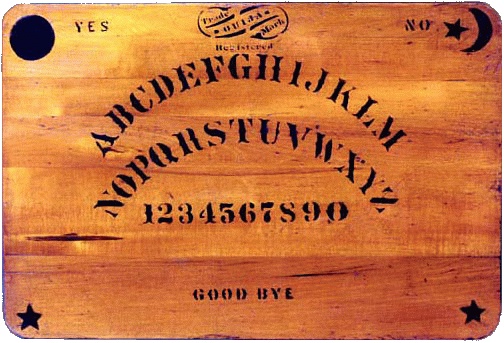
Since in Thailand ghosts and the spirit world play an important role, newly acquired books at the Thammasat University Libraries by an American poet whose works were dictated by ghosts should be of high interest.
The Collected Poems and Selected Poems of James Merrill make enjoyable reading. James Ingram Merrill (1926–1995) wrote his longer poems using a Ouija board. The Ouija, also called a spirit board, is marked with letters and numbers as well as the words yes, no, and goodbye. To use it, people put their fingers on a piece of wood or plastic which in principle is moved by the spirits to spell out messages. Where some other books deal with Ouija boards, such as Stephen King’s novel The Stand, James Merrill was the only major modern writer to be inspired by the Ouija board to write hundreds of pages of poetry. He also wrote shorter poems without the help of the Ouija board.
Merrill’s father was Charles E. Merrill, the founding partner of the successful investment firm Merrill Lynch. The money he inherited made him one of the richest poets in the world. Instead of spending the money on himself, Merrill created his own personal foundation to help writers. He issued generous grants to hundreds of other talented writers and artists who were not as fortunate as he was. Always worried about saving money for his foundation, Merrill could be quite stingy. He would save and reuse envelopes and string, and even write to friends on the back of letters he had received in the mail instead of using a new piece of paper. In New York he stayed in an apartment which his mother had bought for very little money many years before. In a typically thrifty decision, instead of buying a Ouija board, which are available in most shops that sell toys and games, Merrill made his own.

A poet’s life.
With his friend and companion David Jackson, a writer and artist, Merrill lived in Connecticut and Athens, Greece. In later years they spent part of each year in Key West, Florida. Merrill died of AIDs in 1995 at the age of 68. His friends and readers missed his wit and generosity. His poems sometimes seem quite simple, influenced by folklore or popular sayings. For example, his poem “The Kimono”:
“When I returned from lovers’ lane
My hair was white as snow.
Joy, incomprehension, pain
I’d seen like seasons come and go.
How I got home again
Frozen half dead, perhaps you know.[…]
Keep talking while I change into
The pattern of a stream
Bordered with rushes white on blue.
This poem refers to an old American nursery rhyme, Mary Had a Little Lamb. This simple verse for children states: “Mary had a little lamb,/ its fleece was white as snow.” By referring to hair that is as white as snow, the poet is describing the aging process and his romantic life. The poem ends with a description of the kimono which the author enjoyed wearing at home, decorated with the “pattern of a stream/ Bordered with rushes white on blue.”
For over twenty years, Merrill regularly sat at the Ouija board with David Jackson to receive messages from spirits. Some of the people who spoke to the poet this way he had known in earlier years. Others were ancient beings he had never met. Merrill transcribed and interpreted these messages, bringing the world of the dead closer to that of the living. He also managed to be very funny in much of his writing, as in his personal life.

(all images courtesy of Wikimedia Commons).
